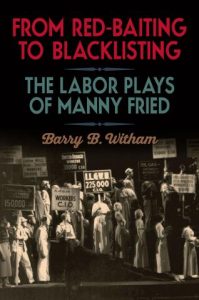From Red-Baiting to Blacklisting: The Labor Plays of Manny Fried
 From Red-Baiting to Blacklisting: The Labor Plays of Manny Fried, by Barry B. Witham (Carbondale: Southern Illinois University Press, 2020)
From Red-Baiting to Blacklisting: The Labor Plays of Manny Fried, by Barry B. Witham (Carbondale: Southern Illinois University Press, 2020)
America’s first “Red Scare” occurred in 1919-1920, following the Bolshevik Revolution. After the Second World War, coinciding with the onset of the Cold War with the Soviet Union, there was a second such era. By aggressively and ruthlessly exploiting the fear of communism at this time, Senator Joseph R. McCarthy became prominent, and the term “McCarthyism” became synonymous with it. As it ran its course, actual and alleged communists were driven from public life. Considerable injury to reputations and careers resulted. From Broadway to Hollywood, suspected communists in the entertainment industry fell victim to blacklisting. Among the ensnared was labor organizer, playwright and actor Emanuel (“Manny”) Fried, who came under the scrutiny of the Federal Bureau of Investigation and the House Committee on Un-American Activities. Refusing to yield to these inquisitors and cease his activities, Fried continued to write plays, though it was difficult to have them produced, and eventually completed his education with B.A. and Ph.D. degrees and obtained college teaching positions. An advocate of communist ideals, he vividly portrayed working people and labor organizations and became a presence in the Buffalo, New York theater community. In From Red-Baiting to Blacklisting, Barry B. Witham restores the stature of this controversial novelist and playwright by recalling his works and struggles and presenting the texts of three of his plays, Elegy for Stanley Gorski, Drop Hammer, and The Dodo Bird.
This study begins with Fried, the product of a working-class neighborhood of Buffalo, who had spent a year on a football scholarship at the University of Iowa, seeking an acting career in New York City during the Great Depression. In New York he joined the Communist Party and began a stage career under the name Edward Mann, appearing in several plays with “left-oriented theatre groups.” Finding it difficult to earn a living, he returned to Buffalo and took a job as artistic director for a local theater. In Buffalo it bothered him that too few of those around him demonstrated a genuine affinity for the working class. He sought kindred spirits who believed that laborers deserved certain rights. That belief and his subsequent employment at the Curtiss Aeroplane and Motor Company, a government contractor, ended his acting career. At Curtiss he recruited for the United Auto Workers (UAW), but was also involved with the Communist Party. That activity led to his rejection by the union, dismissal by the company, and surveillance by the Federal Bureau of Investigation. However, he successfully fought to regain his job, and then recruited for another union, the United Electrical, Radio, and Machine Workers of America (UE).
Fried spent the next four decades, which included two years’ military service in Korea, fending off anti-communist investigators as he engaged in union organizing and play and novel-writing. Through this period he continued to defend the working class, as evidenced by his novel Big Ben Hood (1987), written as unions came under attack during the presidency of Ronald Reagan. In 1954 he defied the House Committee on Un-American Activities when called to testify before it, and then came under the scrutiny of Cointelpro (Counterintelligence Program), a program established by FBI director J. Edgar Hoover to attack civil rights leaders and political dissidents. Somehow Fried survived this onslaught, and continued to write, producing plays such as Elegy for Stanley Gorski (1973), Drop Hammer (1977), and The Dodo Bird (1967), that appear in this volume.
Witham’s subject was an outspoken communist whose works are not readily familiar to the general public. In Drop Hammer he bluntly exposed union corruption, misappropriation of union dues, and criminality. Relevant to today’s worker discontents, in The Dodo Bird
he tackled the effects of de-industrialization. In Elegy for Stanley Gorski, the issue was red-baiting, which had hounded him for many years. Here anger and frustration abound in verbal duels among workers, and exacerbating the conflict is a priest, identified as “Father Hogan,” who represents the Catholic Church, another of Fried’s enemies.
Embroiled in and victimized by the Red Scare, Fried used his writing to exact revenge on the FBI. He successfully sued the bureau for its harassment and gained access to files that had been classified and redacted. In a fascinating epilogue, Witham provides a detailed account of these battles. Direct quotes from surveillance reports on Fried give the book an amazing sense of authenticity, matched only by the candid shop talk of the playwright’s fictional characters. This study of an undaunted, feisty Cold War figure is thus honest and revealing.
Reviewed by Robert D. Parmet, Professor of History, York College of The City University of New York
